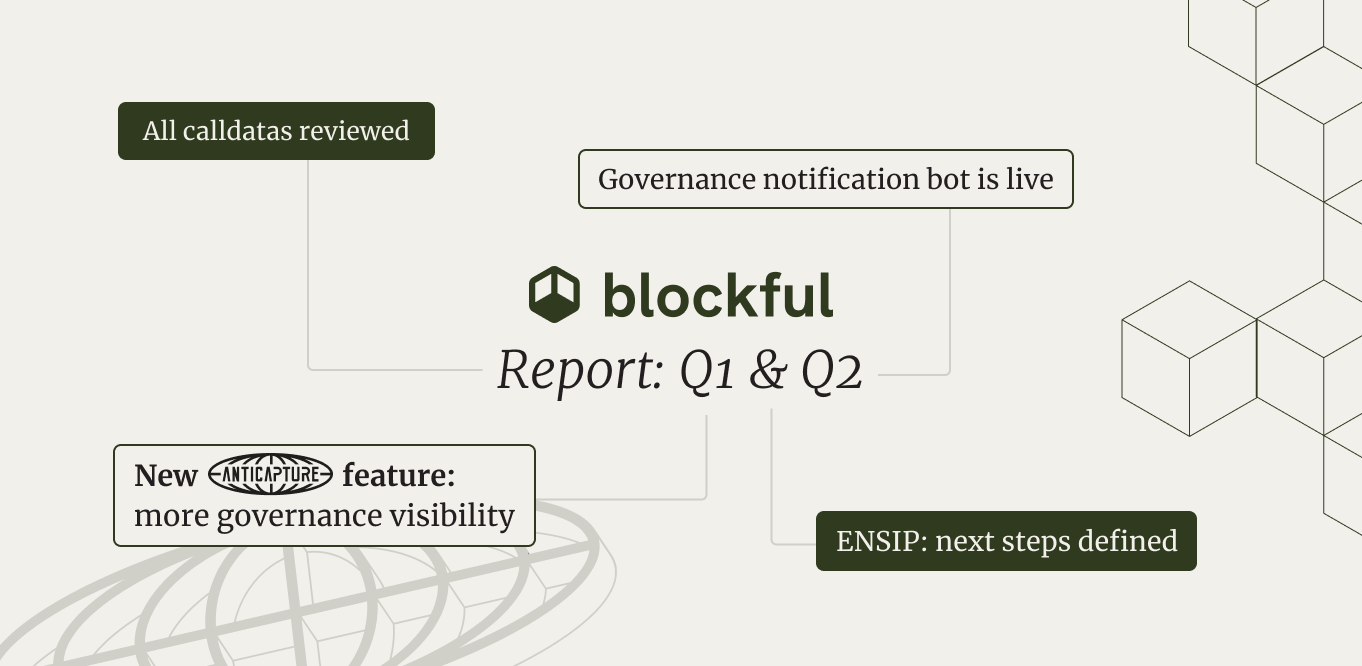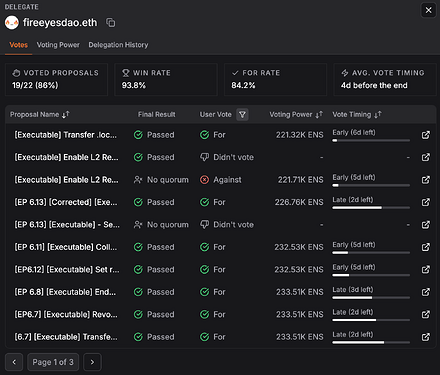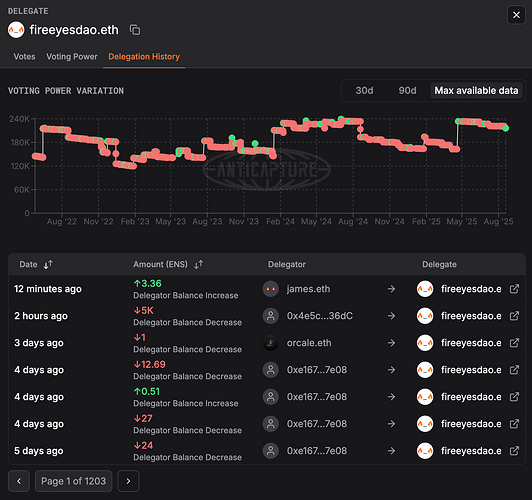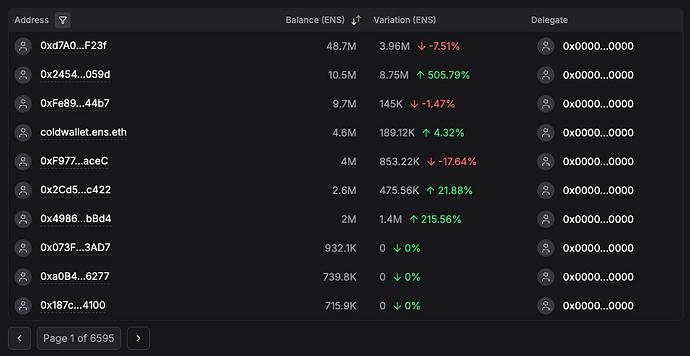2025 Q1 / Q2 Report
Disclaimer: The SPP1 year started in February, and the SPP2 year started in May. From now on, we will report based on calendar quarters rather than the program’s start dates. This makes it easier to track progress over time and keeps our communication consistent with ENS DAO’s broader activity cycles.
Summary
Following our renewal as a Service Provider for ENS DAO, blockful continues its work across key areas of governance security and protocol improvement.
During Q1 and Q2, we delivered timely calldata reviews, notification system is live (beta version), and shipped significant improvements to Anticapture, including a feature called data tables that increase transparency around voting power, participation, and delegation flow.
While ENSIP-related work is in progress with clear next step to move forward on the road to production and adoption.
ENSIP-20
The ENSIP published but might have some small updates to be finished. A PR on ENSjs is open and in the coming month we’ll coordinate with Labs to advance the implementation on ENS manager app and ENSv2, unlocking a better and unified experience for managing domain and records.
| Quarter | KPIs | Status |
|---|---|---|
| Q1 | ENSIP specification documentation completed - Initial ENSjs integration live |
Calldata Review
Between Q1 and Q2, blockful reviewed all proposal calldatas submitted to ENS governance, completing each review within the expected timeframes.
Two reviews are worth highlighting:
- EP 6.11 forum review mistake
We made a mistake in properly validating the calldata as posted. Instead of reviewing the calldata attached to the forum post, we mistakenly generated and tested a new version internally. Although the onchain submission was correct and safely verified before execution, the purpose of the forum-stage validation was missed. If the discrepancy had gone unnoticed, the proposal would have requested less capital than intended and required resubmission.
We shared a detailed explanation of this event on the ENS forum and took immediate steps to improve our internal process, including the introduction of pair reviews and clearer documentation between stages. More suggestions to come on the governance process as well.*
We identified a problem on a live proposal. The transaction simulation on Tenderly passed, but if executed, the proposal would not have achieved its intended goal. We recommended that the DAO vote against the live proposal and encouraged the author to resubmit with corrected calldata. And that’s exactly how these reviews add value to the DAO.
You can read more details here.
Tweet from @ENS_DAO
| Quarter | KPIs | Status |
|---|---|---|
| Q1* | Response to 100% of tagged proposals within SLA |
Anticapture
We continue to improve the dashboard, bringing more reliable and deep data about security, token holders and delegates. A major feature released was data tables, bringing accessibility to important information.
It offers a clear view of governance by combining token holder and delegate information with metrics like average vote timing, percentage of “for” votes, token balance variation, delegation changes, delegator balance increase and decrease, voting power, proposals voted on, and many more.
Having this context next to risk indicators allows us to better understand not just where voting power sits, but how it behaves. It also gives a stronger sense of when and how different actors are participating, something that’s hard to grasp when security data, token holder stats, and delegate actions are viewed separately.
Here you can see the token holders, to who they are delegating, their token balance variation which is extremely insightful in the context of security.
| Quarter | KPIs | Status |
|---|---|---|
| Q1* | Deploy ENS DAO prototype with core governance risk metrics and actionable security insights. | |
| Q2 | Deliver the final DAO Security Staging Framework – Like L2beat – in the ENS dashboard, publicly assessing governance maturity across risk |
Governor Upgrade
As we are first focusing to present and discuss the delegation incentives system with the community. We have this research at an advanced stage internally but will wait until the end of September to post. Contributors who are interested in give early feedback or ideas are more than welcome to reach out and refine it together.
| Quarter | KPIs | Status |
|---|---|---|
| Q1 | Report on recommendations for governor changes |
Delegation Incentives System
During the last Metagov call we have been presenting this research and discussing a solution to incentivize and increase the active voting power. The report will be published in the next weeks, we’re refining as we wanna make sure to come with a well-thought mechanism to execute and test. It involves a lot of simulation and data work.
| Quarter | KPIs | Status |
|---|---|---|
| Q1 | Report about research on effective delegation incentive models |
Notification System
The ENS Notification System has launched! Start receiving ENS governance alerts → anticapture telegram bot
Impact on the long-term
- Increases governance participation and average turnout.
- Helps delegates act on time and stay informed about important changes (delegations, relevant DAO metrics).
- Reliable channel of communication with delegates and token holders.
Current features
- Notify about new onchain proposals
- Notify when a proposal has finished and it’s results
- Add wallets to track and get relevant
- Notify voting power changed for tracked wallets
- Remind delegate about a new vote if he didn’t voted
- Notify if your delegate becomes inactive and doesn’t votes on the last 3 proposals
- ENS resolution
A clear over delivery compared to the Q1 goal ![]() .
.
| Quarter | KPIs | Status |
|---|---|---|
| Q1 | Telegram integration for onchain voting reminder and token holder to warn about inactivity of their delegate |



